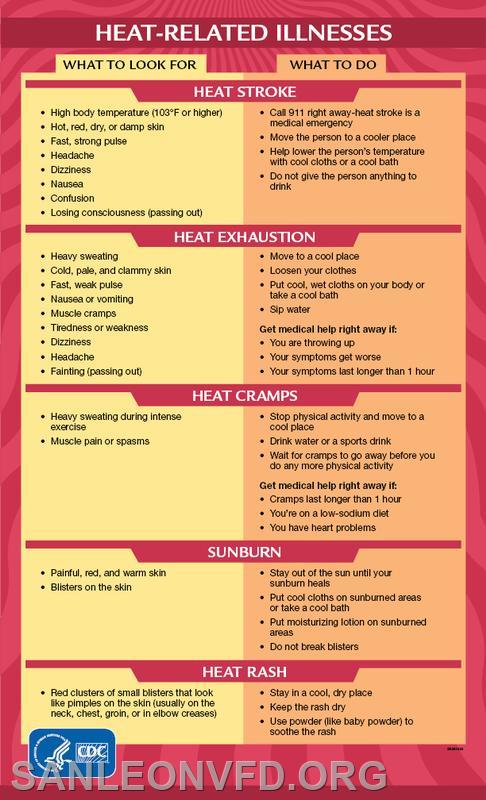| Heat Exhaustion
Heat exhaustion is one of the heat-related syndromes. These syndromes range in severity and seriousness from mild to potentially life-threatening. Other types of heat-related illnesses include heat rash, heat cramps, heat syncope, and heat stroke.
Heat exhaustion can occur when your body loses too much water or salt — usually as a result of excessive sweating or dehydration. It can begin suddenly or happen over time, usually after working, exercising, or playing in the heat.
Heat exhaustion signs and symptoms include:
• Cool, moist skin with goose bumps when in the heat
• Heavy sweating
• Faintness
• Dizziness
• Fatigue
• Weak, rapid pulse
• Low blood pressure upon standing
• Muscle cramps
• Nausea or vomiting
• Headache
• Extreme thirst
• Mild confusion
• Decreased urine output
If you suspect heat exhaustion
Untreated, heat exhaustion can lead to heatstroke, which is a life-threatening condition. If you suspect heat exhaustion, take these steps immediately:
• Move the person out of the heat and into a shady or air-conditioned place.
• Lay the person down and elevate the legs and feet slightly.
• Remove tight or heavy clothing.
• Have the person sip chilled water, a decaffeinated sports drink containing electrolytes or other nonalcoholic beverage without caffeine.
• Cool the person by spraying or sponging with cool water and fanning.
• Monitor the person carefully.
Contact a health care provider if signs or symptoms worsen or if the person doesn't improve after taking first-aid measures.
Call 911 or your local emergency number if the person's condition gets worse, especially if he or she experiences:
• Fainting
• Agitation
• Confusion
• Seizures
• Inability to drink
• Core body temperature — measured by a rectal thermometer — of 104 F (40 C) (heatstroke)
|

